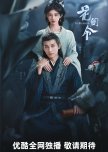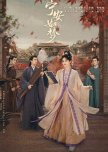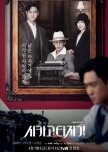
Cette critique peut contenir des spoilers
Dark, beautifully shot….and pretentious
My Journey to You started off very well- it was mysterious, beautifully shot, and with a lovely soundtrack. The world of the show is one where all the female characters except one have ties to a mysterious spy organisation and three (or four) of these women have infiltrated the highly-guarded Gong family. For some strange reason, the Gong family holds a bride selection ever 20 years, and as the show begins, the spy organisation Wufeng has sent spies dressed as brides. Our female lead is also a spy, albeit among the lowest order in this cruel organisation, and she has been handed over an assignment which we as the audience are not fully aware of. It is not enough to trust one woman with a task so Wufeng decides to send three female spies. The bride arc is undoubtedly the most interesting and engaging in the entire show.Immediately a number of different mysteries are placed in the world of the show to be solved by the end. What is Wufeng- what is its purpose, why does it exist? Why is the Gong family so guarded? Why are brides sent to the Gong family? Who are the other clans in this world and what role if any do they have in this Wufeng-Gong fiasco? As the story progresses, similar other questions prop up.
The first ten episodes are fairly well-paced after which I felt the show started dragging: the Gong cousins were at each other throats for far too long without any real reason. It was quite clear that Gong Shang Jue’s primary concern was the Gong family itself and that explains his tough stance towards Gong Zi Yu, so in the end it isn’t really a surprise. Yet, many of the confrontations between the cousins just seemed to repeat themselves, episode after episode. The three trials were far too spaced-out (and frankly somewhat underwhelming) to hold attention. It’s only the last five episodes or so where the pacing improved and the main questions (including who killed Gong Zi Yu’s father) were answered…to some extent.
For a show with so many female spies, women really didn’t have much to do beyond spying (and falling in love). Women are either crazily in love or become coy soon after falling in love (Ziyu’s mother, Gong Zi Shang, even Yun Wei Shan) or chasing some mumbo-jumbo ideas of “freedom” (again, Ziyu’s mother, Yan Wei Shan and Shangguan Qian come to mind), or the verdict is not out on them (e.g., Wuji and Shanggan Qian). Are any of these women (except Gong Zi Shang) even free? Whether it’s being a Wufeng spy or married into the Gong family (which very much resembles a prison for women as they can’t go outside)- all women are in chains, physical and emotional. Gong Zi Shang’s seeking her family's attention is placed on the back burner in front of the love story. What can be more important than romantic love? If women aren’t married or in love they can surely end up being as cruel as the head of Wufeng! The show started off as the FL’s story and ended up being the ML’s story, as he had the strongest arc.
The last episode solved some of the questions asked and then left plenty of other questions unanswered. Perhaps the most jarring one of them: why did the FL go there, and what happened to her? Instead of also critiquing some of the Gong family practices, the screenwriter decided to present Wufeng as a single-headed, mindless organisation with a psychopathic female killer as its head. Of course, plenty of logical fallacies too appear- how did Shangguan Qian manage to mortally injure Jin Fan.
At the end of the show I liked how the cousins had finally bonded; the separation of the back hill boys was sad. Yet, what really was the point of the back hill? What was the point of many of the devices used in this story? There are many positives on the show- particularly the lovely soundtrack, the costumes, the beautiful cinematography, the characters, and the acting to a great extent. The weakest link in my opinion was the plot which meandered to the point of being pretentious. The greatest stories always have deeper subtexts- scratch this one and it is hollow with hardly anything to say beyond its stylistic machinations.
Cet avis était-il utile?

Snowy Night Timeless Love
8 personnes ont trouvé cette critique utile
Cette critique peut contenir des spoilers
Searching for Meaning in a Meaningless World
Snowy Night: Timeless Love or its (better) alternate title Seven Nights of Snow features constant, unending scenery of snowy landscapes against which this beautiful story of grief and regret is set. Some of the snow scenes were shot on location and some were recreated - yes the CGI can be a bit underwhelming, and the premise of the male lead returning to the Apothecary Valley while retaining terrible injuries during the course of eight years may sound uninspiring. Yet, underneath this repetitive facade lies a poignant and reflective tale of grief, love and sacrifice.There's the seemingly cold medical-doctor Xue Ziye and the equally cold Apothecary Valley. Our male lead Huo Zhanbai is the righteous and kindhearted (to a fault) seventh brother of the Sword Sect. Appearances can be deceiving -as the eight years roll by we learn that Xue Ziye is neither cold nor lustful. Huo Zhanbai's task over the eight years is a meaningless one - finding herbs that will serve no real purpose apart from giving him a reason to live. His grief outweighs the pain he suffers from searching for the herbs - so he would suffer physically then lose hope altogether. Sometimes one needs only one reason to live. Xue Ziye's shifu later on points out that a lie saved three lives. For Xue Ziye, her own reasons to survive was the hope of reviving her old childhood friend - in order to do so she herself finds meaning in several meaningless tasks - rootless water, rootless plants - all of which can hardly manifest into anything. Huo Zhanbai's path to self-redemption is itself meaningless as there is nothing to redeem. His self-sacrificing kindness overshadows everyone else in the beginning half of the show only to be surpassed by Xue Ziye acts of self-sacrifice in the last few episodes.
Both these characters, in their silent ways, find companionship in each other and heal from their wounds. Perhaps the most poignant scenes are the ones where the two of them sit together sipping wine. Sometimes they stare at the moon, sometimes they wait for the epiphyllum to bloom. That was one of the most telling moments on the show: the beauty of a certain moment - watching flowers bloom. No physicality could surpass the silence of beauty. These were the slow moments on the show that I thoroughly enjoyed. In an age where one needs to slow down - these moments were meditative, poetic and meaningful. Sometimes the greatest meaning lies in the little things and it's those little things that make up the big things.
By no means is this a happy show - many of its characters suffer incessantly and in different ways. Mingjie, Miao Feng and Miao Shui are also victims in some way or another. I enjoyed the way the stories of all these characters was revealed during the course of the show. Miao Feng's true personality is revealed much later and he makes for another very interesting character. The bonds that the characters share was another highlight of the show. The silent unspoken love between Huo Zhanbai and Xue Ziye. The bonds between Xue Ziye and Miao Feng which were heartbreaking towards the end. The love between Xue Ziye and Mingjie which reached its peak in episode 29 with the beautiful scene where both actors gave an outstanding and heart wrenching performance. There were other bonds too - mother and son, lost siblings, shifu and her students - each wrought by boundless sacrifice.
Yes this is a tragedy but it is by far one of the most beautiful tragedies I've watched recently. It is never dark or gruesome and perhaps never too complex in its plots. Instead its complexity lies in human relationships and emotions, where silence outweighs the noises of the world, where love, kindness and sacrifice is unforgotten and where hope can be found even in the greatest sadness.
Cet avis était-il utile?

Cette critique peut contenir des spoilers
Beautiful cinematography, lacklustre last quarter
Wonderland of Love was a show I started watching while waiting for SOKP’s new episodes. I did not expect much from WoL- the title suggested a focus on romance and I had little interest in picking up a Xu Kai show as I hadn’t enjoyed any of his last performances.However, I would say that up till episode 32, this was a solid show. The characters are interesting, particularly Li Ni (Xu Kai), and the veteran actors particularly elevated this show. The show had some of the best cinematography I’ve seen this year - like this director’s other works (The Untamed and even Legends) there are lovely shots of characters standing on rocks. The scene with Ciu Lin and Li Ni in the grass was lovely.
When it started, Wonderland of Love was a story about doing what’s right over what one desires out of life. For Shiqi what he truly desired was to be free. Yet Ciu Lin pushed him to be the crown prince, and he was so determined not to tread this path that he even broke up with her for that. In a way theirs was a deep love that goes beyond separation and insignificant matters. They each stand for what they believe them and defend those beliefs even if it meant to separate from each other. Love should not demand the sacrifice of one’s true self, and despite their love for each other, I liked that they respected each other, even if different values guided them.
The best episodes on the show were definitely episode 30 and 31. 30 was heartbreaking- the camaraderie and affection between Shiqi and the other guys makes this episode both shocking as well as tragic. None of the deaths are just for shock value - the friends say their farewells to Shiqi in a dream sequence in episode 31 complemented by Chen Xueran’s beautiful song. This is the best I have seen of Xu Kai- his restrained grief was very well done, and his scene with Jing Tian as he recuperated was really heartbreaking, as was his memorial for his friends. The scene was beautiful - Xu Kai (Li Ni) spitting blood after taking a sip of the wine, and the bamboo grasshoppers falling from the sky.
The cinematography was spectacular, really. At least until episode 31.
I wouldn't say that the beginning episodes were perfect - they were plenty of choppy moments - the editing was simply off for a long time, but still one tried to piece everything together. It made sense to some extent. Then came the best episodes: 30 and 31. Then, the show went in another direction. There were unnecessary villains - very annoying, clingy characters that never get a hint. I started forwarding the remaining episodes.
Anyway I hung on till episode 40, which was actually better than the episodes preceding it. The moment between the father and son in episode 40 was touching, but it did not really allow Shiqi the opportunity to heal those childhood wounds from the lack of love he received from his father.
I think Xu Kai did the best he could with whatever he had - this role suited him well. Jing Tian was good too, although I did not enjoy her character's trajectory from a cool woman to crown princess/empress. Somewhere along the line I’m not sure what the show really was about.
Is it worth watching? I think so - particularly for the first 31 episodes, for the beautiful cinematography and for the performances overall. I enjoyed many of the supporting characters- Consort Xiao’s love story was lovely, and the bond between the imperial grandson and Han was touching too. There were certainly many solid moments. If only this script matched up to some of the cinematography then perhaps it would have made for a better show.
Cet avis était-il utile?

Cette critique peut contenir des spoilers
Promised more than it delivered?
I really enjoyed the beginning episodes of Romance on the Farm. It was overall a good, generally lighthearted show. I enjoyed many of the characters and the great performances. The scenes on the farm where the actors are working in the fields were very well done and that could have made for a lovely, healing show. Many of us are starved of such open endless rich natural surroundings, so watching this drama on farming was truly heartwarming. The vegetables, the greens- they were fresh and the lush green fields were beautiful. There was a family, which at least for the female lead that had entered this game world, here was a chance at being loved and belonging. Everything seemed just right.Yet, the show is a spectacular example of not being self-aware. Is it a romance? Is it about family? Is it about rural politics? Is it about all of these?
This could have been a great show. There was potential and in the beginning there was the momentum. The ordinary life of farmers, the loving and not-so-loving family members. The bride burning and the selling of family members. Miscarriages. Irresponsible brothers, fathers, mothers, cousins, nieces that are incapable of understanding the suffering they inflict upon another member of their family. It’s only when they are faced with external suffering that they spring back to more acceptable versions of themselves. Family is family- no matter how horrible (and toxic) they have been and how much injustice has been inflicted.
That being said, the scenes of this highly strange and interesting family were in many ways realistic. This show was perhaps trying to describe too many things and ended up not being able to stick to anything. I would have liked the show to either get rid of the gaming concept or explore the complexities of virtual reality/gaming and the desire for belongingness, which evidently is crucial to the female lead’s story and yet goes unexplored. There are so many possible philosophical explorations of this situation but the show never ventures there.
The last five or six episodes were quite tedious to watch. There was far too much unnecessary political drama. The worst part was when events are reversed rendering them meaningless. Case in point: the family being forced to leave their land and the grandfather’s bowing to the land was a touching moment ruined by the swift return as though nothing happened. The worst of these is when death itself is reversed. Yes we see that on xianxias where the logic is different, but what purpose did the weeping and desperation of the characters serve when everything was reversed anyway*
So for me, these are glaringly annoying negatives: no clear overarching plot; the gaming part was undeveloped, and a weak last arc. Transmigration themes are getting outdated.
Should you watch it? Yes, it is still an enjoyable show with very good performances. I enjoyed Tian Xiwei’s character and her performance- she played a strong female character that gets things done and that was highly enjoyable. Zeng Shunxi was very good too and their chemistry really worked. The supporting characters were very good too, making us love some of them and hate the others. 8.25/10 for me.
Cet avis était-il utile?

Cette critique peut contenir des spoilers
A very good suspense drama
I started In Blossom with a little hesitation - Ju Jingyi's (JJY) last few shows have been quite underwhelming with all the dangling hair bits. I absolutely enjoyed her performance in Yunxi (and even in In a Class of Her Own) but everything else has been quite lacklustre. Nonetheless, beneath all the focus on beauty, I do think Ju Jingyi has potential, and I have been waiting for her to pull another Yunxi. Is her performance in In Blossom as good as Yunxi? I would say it's much better than everything else she has done recently - I can see the effort she has put in, and I hope that she would pick better projects that allow her to go beyond her comfort zoneThat being said, I wish to state this- focusing on JJY alone (with the criticism of her makeup and all) takes away from a very solid original story. Yes, In Blossom starts with another actress and then JJY takes over- the other actress was very good but JJY was by no means bad. I found her chemistry with Liu Xueyi to be very good, and one of the things that I really loved was the love story - the love and respect that the two characters had for each other, particularly Pan Yue's devotion towards Yang Caiwei. This was a slow burn love story - Pan Yue's childhood love and his early marriage to Yang Caiwei (well, to Shangguan Zhi in reality) was borne out of his commitment towards her. However, as we watch the interactions of the two, a true love story emerges - out of a deep understanding and mutual respect. It was a joy to watch these two develop their feelings for each other.
While I enjoyed the love story, the greatest pull was the plot - an original story, very well crafted (although by no means perfect) with some really enjoyable and unpredictable cases which our leads work on. I even shed a tear or two over these cases, with great performances by several guest actors. These cases made the show very engaging - individual cases interwoven into a larger one. The characters were very well-written and acted, and while some actions may not have had much sense I can see why they headed in that direction. Yang Caiwei/Shangguan Zhi is an intelligent woman, although she is no martial artist, and it's enjoyable to watch her crack these cases, together with Pan Yue.
That brings me to Pan Yue, acted perfectly by Liu Xueyi. I was delighted to see Liu Xueyi play this character, as the male lead, so different from the ones he has done in the past (he was brilliant as Wuxin in The Blood of Youth too, and in every role he has played including all the antagonists). Liu Xueyi's performance was nuanced (and I couldn't help saying aww many times he was on screen).
It would have been great to solve the face swapping issue - the show doesn't exactly explain how that happened. Nonetheless I have to say that this was one of the better shows this year - I highly recommend it, particularly for its cases. I greatly enjoyed the story and the beautiful cinematography, the acting and the OST. I happily rate it 8.6/10.
Cet avis était-il utile?

Story of Kunning Palace
17 personnes ont trouvé cette critique utile
Cette critique peut contenir des spoilers
Disappointingly overrated
Ning an Ru Meng started off very well and somewhere around the 15th episode I was convinced this was one of the best historical dramas this year, It certainly had all the right elements: a potential redemption arc, political intrigue, interesting characters.Let's start with the positives: I enjoyed many things on the show. The flashbacks to the previous "life" were very engaging and well tied to the present. I enjoyed many of the characters and their little arcs. Among them the characters with the most engaging character arcs were You Fangyin (whose arc kind of ended very early on) and the princess (a very good performance from Liu Xie Ning). The political drama was overall quite enjoyable till the second half of the show, although a lot of it wasn't particularly complex or unseen before.
Now the negatives:
The romance. Yes, the “romance”. Replace the handsome Zhang Linghe with a not-so-pleasant-faced actor and many of the things he did to Ning will appear creepy. Yes, very very creepy. A teacher who has power over her - who can kiss her forcibly and make her cry. And how many times did Xie Wei do this? Episode 32, episode 34, ep 36. This toxic love story is sold to audiences at fantastic paces. In episode 34 Ning tells XW that she does not love him, so what is his response? Basically it was something on the lines of- “the things you’ve done for me prove you love me” and then he drags her outside and forces her to plunge a knife into his stomach. Hmm. Ning has done a lot of good things for many people- does that mean that she loves them all?
Well, that brings me to the person she actually loved for most of the show - Zhang Zhe. She loved him so much that she died for him in the previous “life”, and she retained those feelings. It soon became obvious that the two of them loved each other. So, circumstances allowed his feelings for her to grow - he was certain she loved him too, and in this life there were no real barriers to them being together. In fact, as it is established later on, her father would have readily chosen Zhang Zhe as a son-in-law. Yet, the novelist/screenwriter decided to put an end to this love story in the most ridiculous way possible. No-one breaks up with the one they love when their beloved is suffering. Soon after his mother died, Ning decides to break up with him and she chooses to do it by pretending that she never loved him, wringing his heart dry. It was absolutely convenient for the story not to show Zhang Zhe much later either, and neither do we watch Ning weep over him.
What was the reason for that breakup? Truly insignificant. In order to prevent him from hurting further, she hurt him even more. It truly makes no sense. Are the novelist and screenwriters suggesting that good people don’t end well? Evidently, one need not look further than Zhang Zhe to find that.
In truth the purpose of cutting short this love story short is to allow the male lead and female lead to get together. By episode 34 however, she herself says that she doesn’t love Xie Wei. Of course, everyone is busy convincing her that she DOES love him. The music is suggesting that, and all of XW’s crazy, obsessive behaviour suddenly appear romantic.
Show don’t tell- evidently the screenwriter forgot that.
Xie Wei kisses Ning’s forehead after she is flogged by Xue Shu. As I said earlier- replace ZLH with someone ugly and this won’t fly that well. Her father happens to see this and confronts XW indirectly, but XW’s reaction is hardly apologetic. Instead it’s almost as though he owns her. Then when he goes “crazy” he kisses her forcibly. The background music really presents it as the most romantic scene ever.
This toxic “love” story is presented as the most beautiful one and that is truly a concern. The wrist-pulling, force-kissing abusive ML is presented as an ideal partner? Is it 2023?
I think had this story been placed in the back burner I would have been somewhat okay with it, but when the screenwriter decided that the ML and FL must be together the plot turned to ridiculous mush. All the palace politics that had held my attention earlier dissipated.
This show started off solid - it was interesting, and then it nosedived its way into a toxic “romance” with the historical bits taking . The performances have been good, and ZLH may have received his best role so far. I really enjoyed several characters and I wish the show makers had spent more time on those character arcs.
Overall I am so so disappointed. and I think 8 is already too high.
(My actual rating: 7.75)
Cet avis était-il utile?

Cette critique peut contenir des spoilers
A melancholic tale of friendship, regret and redemption
I write this review nearly two years after I first watched Chicago Typewriter - on second viewing, and as I mulled over the show for these years, I find that the drama still retains its powerful emotional core. With the second viewing the tears are stronger, because I know where it is headed and what all the pieces of the puzzle mean. Despite some flaws (is anything really perfect?) Chicago Typewriter is, at its heart, a story of friendship and love that traverses two lifetimes. There is longing, and for one character the journey towards redemption is marred by his own deep regret. Indeed for all the three characters, they find themselves when they find each other - this is such a deep, unwavering friendship and love. The present only makes sense when we know who we have been in the past, and yet as Se-joo reminds Yoo Jin-Oh, he is not Shin Yool. One can look at the past and the present as two halves of the story, and yet never live in the past, the story tells us. Acknowledge it, accept it, learn from it and move on. I loved Se-joo’s last meeting with his foster brother- he had emerged in the end a fully developed person, who was kind, considerate and self-aware. Undoubtedly his two friends made him thus. He learned to trust again, to love wholeheartedly and without fear. You don’t need too many people- just one or two who truly understand you. This was a complex story- weaving of pasts and present, and what wonderful characters! Even if not through reincarnation we all change, and both Hwi-young and Soo-hyun are examples of this.This series, in my opinion, stands as one of the greatest, whether English, Korean or otherwise. Truly an outstanding show that will stay with you for a long time. Deep, philosophical, poetic, meaningful, and I must say, melancholic. Excellent performances by Yoo Ah-in (Han Se-joo/Seo Hwi-young), Im Soo-jung (Jeon Seol/Ryu Soo-hyun) and Go Kyung-pyo (Yoo Jin-oh/ Shin Yool), and all three shine in their emotional moments. Kwak Si-yang and the other supporting actors were excellent too. Outstanding cinematography, excellent direction, and oh, what a fantastic soundtrack. Just listening to the songs, particularly ‘Satellite’, ‘Time Walk’ and ‘Writing Our Stories’ takes me back to the series, and I realise that as a viewer I am pulled into the story, and it feels nostalgic, and melancholic: sitting with friends you love and doing something meaningful. Unlike other shows, this has very few people on whom the three leads can depend upon. This one isn’t about boisterous appeals of humanity but subtle ones. Highly recommended, but be patient, as everything makes sense when the show is over.
Cet avis était-il utile?

My Love from the Ocean
2 personnes ont trouvé cette critique utile
An unexpectedly melancholic allegorical tale
I watched this show with extremely low expectations - the decision to title it too close to a Korean drama plus the possibility of its similarities to another Korean drama - led me to believe that this was going to end up being a very poor imitation.Yet, I was so wrong.
Underneath a not-so-wealthy production is a poignant, allegorical tale that is infinitely deeper than it appears to be. Yes, the visual effects may not be the best, but the solid writing, acting and the general melancholic tone of the show makes me give this a very high rating. In the world of the show everything falls in place and there are hardly any major plot holes, which is very possible with a complex topic like this one.
This is a literal fish-out-of-water tale, about being different, about greed and power. It is also a reflection upon multiple ways of loving. Despite having very little romance the show contemplates on the nature of sacrificial love versus selfish love. I found Chi Lu and Dai Xi's love for each other, although simmering in the background, to be one of the most beautiful love stories.
The acting was very well-suited for this tale, and the character motivations made sense - why does greed become a driving force for some people? Some of the scenes reminded me of actual historical events and really highlight the beauty of humanity as well as the raw brutality that so many parts/people of the world experienced during wars and other tragedies.
Zhou Yutong and Li Hongyi played their characters like two very young souls navigating the world. It would have made sense to write Li Hongyi as a 20 year old instead of 25 (the actor himself was only 18 or 19) but that is something easily forgotten. Li Hongyi sang three of the songs on the OST (one with Zhou Yutong) and although the background music is a bit loud sometimes, the music is fantastic and I can see how much effort was put into the lyrics, composition and the singing.
I strongly recommend this to those who enjoy melancholic, deep and allegorical storytelling, as beyond its technical deficiencies, this really is a beautiful show.
Cet avis était-il utile?

La Légende de Shen Li
3 personnes ont trouvé cette critique utile
Cette critique peut contenir des spoilers
A chicken parading as a phoenix
I was really looking forward to Shen Li as I have really enjoyed this author’s works and I’ve loved all of ZLY’s performances.There were several touching moments in the beginning of the show - I was very moved by the story of the soldier and the wife - it was beautifully done and the actors who played the part did so phenomenally. Kudos to them. I enjoyed the idea of cluck cluck and the sickly man, and was moved when that arc came to an end. Shen Li revisited the place she had lived for a short time of her life, it was poignant and sad. One cannot return to the past as it stands on its own.
That being said, I have mixed feelings about this show overall.
I know it’s an unpopular opinion but this show became extremely slow and boring. Often the show felt as though it was catering to fans of Princess Agents who were left stranded with its lacklustre ending. Yes, the two leads have good chemistry but chemistry can’t make up for a paper thin plot that should have kept to 25 episodes or fewer. Most xianxias have a lot happening, even if they are common tropes and this one was excruciating slow with this draggy plot. The novel works because the FL’s narration and feelings carry it through.
Yet, not all literary techniques are well translated into film/the visual medium and this show is a good example of that. Shen Li’s voice overs were overused in the early part of the show and often they seemed to deny secondary characters agency.
As I finished the show I felt quite frustrated that secondary characters were not fully developed nor was enough time spent on them. For a 39 episode show secondary characters are paramount. The marriage arc went on forever and ever.
In the end i was left wondering- what happened to Shen Li’s father? Why didn’t she even think about him. It just happened. Mo Fang’s dying scene was quite sad- I pitied him, despite his faults, he did try to protect her. He was left there, without a glance from Shen Li or a final farewell. What an unfortunate character, which Shen Li herself observes.
What happened to Mo Fang’s father? What really was the point of the story? Why did Shen Li fall in love with Xingyun?
The acting was not the problem at all. I found Kenny Lin’s performance here to be among his best. The idea of the lonely ancient god was interesting and Kenny Lin expressed his loneliness well. His crying scene with Zhao Liying towards the end was very good. I really enjoyed the rest of the actors who did the best with whatever they had. Fu Rong Jun has the most character growth and he became one of my favourite characters. I enjoyed the actor’s performance. Jackie Li was great as usual but had limited screen time. I looked forward to seeing the siblings (and those were the parts I watched without skipping).
The music was good overall without the usual xianxia angst. I did not enjoy the xianxia angst when I watched my first xianxia but that’s what I appreciate these days.
Perhaps I had great expectations from the show but for me it was too slow, too thin with its plot. I think some Chinese shows should stick to shorter episodes. Quantity isn’t quality after all. A chicken should not pass for a phoenix. There's nothing wrong with being a chicken though- it has its place in the world.
Cet avis était-il utile?

A River Runs Through It
1 personnes ont trouvé cette critique utile
Cette critique peut contenir des spoilers
Beautiful beginning and a not-so-beautiful ending
A River Runs Through It has the beauty of the older and brilliant Chinese school dramas (With You, My Huckleberry Friends, When We Were Young, A Love So Beautiful). It is a tale of friendship, family, love, school, college life and of the numerous joys and sorrows that lace the journey of life. A poignant tale about growing up, its brilliant performances truly make this a strong watch. Every character was the centre of their own story, and I, like many others, laughed and wept with most of the characters.Xia Xiaoju's relationship with her mother was so meaningfully written that when the two reconcile after Xiaoju has moved to college, tears ran down my cheeks. The show managed to make me cry or tear up many times - the world of ARRTI felt lived in and real; the characters felt real. The friendships were heartwarming and beautiful, and for the most part, the show was about these friendships- the deep understanding between the three main leads, and their affection for each other. Certainly the strength of show lies with its profoundly well-written friendships. From the five friends, to the three (and even four/five if we count Le Tao and Huang Jun) and then finally to the touching friendship between Xiaoju and Lu Shiyi. 'Growing up means separation' as Xiaoju says to herself later on in the show, in what I consider to be the most philosophical moment on the show: to grow up is to separate from friends and loved ones. People move away as life gets in the way.
Growing up however entails falling in love too, and this story has a lot of unreciprocated love, unfulfilled love, heartbreaks and breakups. Yet, unlike many other shows, I was invested in these relationships which largely involved the secondary (and even tertiary) characters. They felt believable and their stories were not centred around the main leads- they were the masters of their own stories.
I really liked the main leads together and separately - I rooted for them. The friendship between the three was absolutely lovely and when Cheng Lang wasn't with them later on, Li Shiyu and Xia Xiaoju were great friends of each other. They understood each other, cared for each other.
I would have perhaps sang many praises of this beautiful friendship had I not been utterly disappointed by the lacklustre ending. What was it with this ending? what was the point of this ending? Was it supposed to be like With You, and yet in With You the separation made sense (the broken Yu Huai did not believe himself worthy of love- he wasn't the best of himself and that was WHY he disappeared- it made sense). However, why does Li Shiyu disappear without telling her anything? Or without even contacting her through 7 years? He did not suffer from low self-esteem and self-worth and did not have the family burdens that Yu Huai did. Also, it's strange that he doesn't visit his parents in 7 years? In that case he would definitely bumped into her. (My Calorie Boy also did the With You-style ending, which did not work for me either)
The last two episodes were truly a disservice to the main leads. I felt very sorry for Xia Xiaoju- her best friend and the one she finally came to love just ghosted and disappeared on her. After 7 years, the writers decided to fix the problem in just two-three days of interactions. We did not ever learn why he disappeared; why he had pictures with that other girl, etc. The proposal scene at the wedding made zero sense too. Ah. well.
Although I am disappointed with the last two episodes, it does not take away from the beauty of the first half (and more) of the show. It is still a very good show, and certainly one of the best in recent years.
Cet avis était-il utile?

A mature, fluffy "romance" that could have been much better
I must start this review by saying that I watched this solely for Xiao Zhan, and was not particularly impressed with the trope-heavy first episode. Nonetheless, the show did get better till I considered an 8.5 for this show, only to be a bit disappointed with the last episode.There were certainly many positives. Although the show appears to be a romance it is more a navigating-through-life drama. There are many lessons to be learned, particularly for the young but mature Sheng Yang who has to learn to manoeuvre through his career aspirations, love, and his parents' expectations of and from him. The scenes at work were really well-written and well-done, and all the circumstances and the outcomes made perfect sense. It was during work that the friendship between Sheng Yang, Song Chen and Pan Rou evolved and the interactions between these three made for some of the best moments on the show.
Although falling in love is easier, working with it is the hardest. Jian Bing (Bai Bai He was great in the role) knows this perfectly well, so her reactions and her hesitance are fully comprehensible. Despite the utterly out-of-character Jian Bing in the beginning episodes, what we get is a mature, introverted, solemn and measured Jian Bing whose wisdom and age show in her actions. Her mentoring of Sheng Yang made for some of the best moments on the show- she rubs off on him in all the best of ways, through her words and actions. Jian Bing is a role model, someone to aspire to and such female mentoring is truly wonderful to watch. We should befriend and fall for those who make us better versions of ourselves, and that is perhaps one of the best takeaways from the show.
I looked forward to these interactions- between Sheng Yang and Jian Bing, between Sheng Yang and his parents (his parents were such beautifully-written characters!), Sheng Yang and his friends, but unfortunately, for some strange reason, the show makers decided to spent a large amount of time on the ice hockey trio- characters that emerged out of a need to showcase this game, and from the game multiple unnecessary interactions emerged. Sadly, I forwarded many of the scenes involving these characters, and was thoroughly disappointed when a large proportion of the last episode was devoted to these characters. By doing so, necessary screen time for the main characters was unduly snatched.
The acting was fantastic throughout- I enjoyed most of the characters (except the hockey trio, although I cannot blame their performances). I really enjoyed Wang Lin and Yang Hao Yu's performance and their characters- they had excellent chemistry with each other and with Xiao Zhan. I've seen Liu Xun and Julia Xiang in other roles and they were great here. Tian Yu's Xue Yi Ming may have been annoying at times, but I am glad that he did have Jian Bing's back and their unaffected friendship was touching. Liang Shan Shan (Zhu Zhu) was an interesting character, and again, her (and Xue Yi Ming's) devotion towards Jian Bing was one of the show's highlights.
The last episode was underwhelming; too much time was devoted to secondary characters and the last few minutes did not seem consistent with the main characters' personalities.
Nonetheless, this is a good watch overall.
Cet avis était-il utile?



